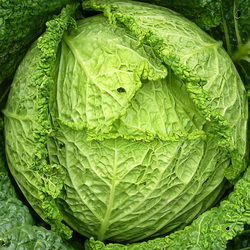Superfood: Cabbage

Don't underestimate the power of cabbage!
Cruciferous vegetables like cabbage have nutrients that actually affect our genes! They tell our genes to increase production of enzymes involved in detoxification, which help our bodies eliminate harmful compounds. They improve our body’s ability to protect against free radicals and toxins, including potential carcinogens. This may be why cruciferous vegetables appear to lower our risk of cancer more effectively than any other vegetables or fruits.
In a study of over 1,000 men conducted at the Fred Hutchinson Cancer Research Center in Seattle, WA, those eating 28 servings of vegetables a week had a 35% lower risk of prostate cancer, but those consuming just 3 or more servings of cruciferous vegetables each week had a 44% lower prostate cancer risk.
In the Netherlands Study on Diet and Cancer, those eating the most vegetables benefited with a 25% lower risk of colorectal cancers, but those eating the most cruciferous vegetables did almost twice as well with a 49% drop in their colorectal cancer risk.
Additional studies have shown the benefits of eating cruciferous vegetables for other cancer varieties including lung, breast, bladder, colon, and ovarian. Other studies have shown benefits with digestive health, Alzheimer’s disease, and cardiovascular health.
To optimize the benefits of eating cabbage, research suggests eating it uncooked or short-cooked. Long-cooking cabbage reduces the beneficial phytonutrients. Fermented cabbage, better known as sauerkraut, is also a great option. For even more benefit, choose red cabbage over white cabbage, because it is packed with even more of the healthy nutrients. Find out more at www.whfoods.com
In a study of over 1,000 men conducted at the Fred Hutchinson Cancer Research Center in Seattle, WA, those eating 28 servings of vegetables a week had a 35% lower risk of prostate cancer, but those consuming just 3 or more servings of cruciferous vegetables each week had a 44% lower prostate cancer risk.
In the Netherlands Study on Diet and Cancer, those eating the most vegetables benefited with a 25% lower risk of colorectal cancers, but those eating the most cruciferous vegetables did almost twice as well with a 49% drop in their colorectal cancer risk.
Additional studies have shown the benefits of eating cruciferous vegetables for other cancer varieties including lung, breast, bladder, colon, and ovarian. Other studies have shown benefits with digestive health, Alzheimer’s disease, and cardiovascular health.
To optimize the benefits of eating cabbage, research suggests eating it uncooked or short-cooked. Long-cooking cabbage reduces the beneficial phytonutrients. Fermented cabbage, better known as sauerkraut, is also a great option. For even more benefit, choose red cabbage over white cabbage, because it is packed with even more of the healthy nutrients. Find out more at www.whfoods.com



